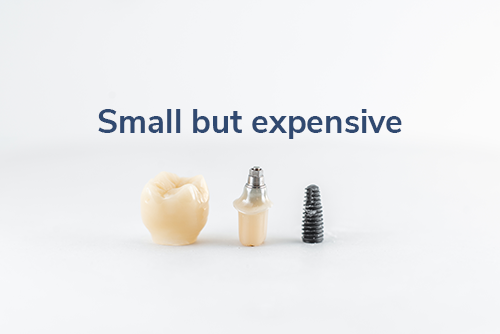Time to read : 4 Minutes
How Much Do Dental Implants Cost And Hurt?
We might consider ourselves lucky to live in a country with a robust public health system and plenty of options when it comes to private healthcare, but not all Aussies take care of their teeth like they should.
😱 A frightening statistic is that barely half of Australian adults brush their teeth twice daily – so it’s no wonder tooth decay is the most common chronic disease in the country.
🦷 One of the only remedies for serious teeth issues is a dental implant. But just how much do they cost, and does the procedure hurt?
So what do you need to know?
Some insurers won’t cover the cost of dental implants if they deem them to be a ‘cosmetic treatment’.
There are lots of different types of dental implant. You could pay anything from $2,500 for a first-stage placement through to $40k [SJ2] for a full mouth reconstruction.
The good news is that dental implant surgery is painless, with your mouth being numbed prior to the procedure – though there is some discomfort afterwards.
Always read your health cover’s PDS – depending on your policy, you might need to pay for most, if not all, of the treatment.
The real cost of dental implants
Price is probably your first concern if you need a dental implant. After all, if you have decent health insurance and extras cover you probably expect that most of the costs will be taken care of by your insurer – but that’s usually the exception rather than the rule.
☺️ While it’s not exactly cheap, the average cost for first-stage dental implant placement is around $2,500 to $3,000. But beware additional costs and different types of implants…
🙁 If you need an implant-supported bridge, that can cost anywhere between $6,700 right up to $20,500 depending on the number of implants and their location along the gum.
😲 Implant-retained dentures generally start around the $4,900 mark, but complete dentures can exceed $15,000.
😠 Going all-out for an All-on-4 dental implant? Hopefully you’ve got a cool $23,000 to $27,000 stashed away.
🤯 If your oral health professional says the only solution is a full mouth reconstruction, that service will generally be in the ballpark of $36,000 to $40,000.
Check the fine print: If you take out extras cover for the purpose of getting most of your dental work covered, it pays to read the fine print on the PDS. Unfortunately, you might be left with (another) bad taste in your mouth. This is because some providers consider dental implants as part of cosmetic dentistry, and they won’t pay for a cent of your procedure.
The long and short of how dental implants work
Price isn’t the only consideration when it comes to dental implants.
For many of us, we are not too fond of visits to the dentist. So finding out you need a dental implant can cause waves of stress as you worry about the pain of such a procedure.
Painless treatment: Good news! The nerves in your mouth will be numbed prior to the dental implant placement. So while it may not be your most comfortable dental appointment, you shouldn’t expect to feel any actual pain.
Time is of the essence: Most dental implants take between 1–2 hours to complete.
Long-lasting: You won’t be back for Round 2 anytime soon. In fact, if your oral surgeon uses titanium screws you can expect the implant to last a lifetime. It’s just the crown that may need replacing every 5–15 years.
Five tips before taking the plunge with dental implants
Check to see if you are covered: With some health insurers not including dental implants on their extras policy (because they consider it a cosmetic treatment), make sure you know whether you’ll be on the hook for the whole bill.
Find a better provider: Now might be the perfect time to upgrade your policy, add extras cover or switch to a more appropriate insurer. Comparing health and extras cover is made easy when you do it online.
Do your own research: Spend some time mastering the art of Google-fu and research what to expect with a dental implant procedure. It can actually put your mind at ease when you hear stories from people who’ve already gone through the treatment.
Speak to friends and family: If someone in your social circle has had dental issues before – especially dental implants – ask them about their experience and for any tips. Who knows? They might even refer you to a great oral surgeon who can make the whole process much more comfortable!
Plan ahead and the book: Be aware that most dental implants – especially more comprehensive procedures like an All-on-4 implant – can cause swelling and soreness for a few days.[SJ9] So you might need to book some time off work following treatment.
The bottom line is...
The most important thing you can do right now is take care of your teeth.
🫶That means brushing twice daily, flossing regularly and seeing your dentist at least once a year – but preferably every six months.
👍 If you do end up needing a dental implant, it’s best that you know about it early before serious decay can set in.
Read more:
What’s the difference between Gold, Silver and Bronze Hospital cover?
Health insurance isn’t addressing Australia’s mental health crisis
